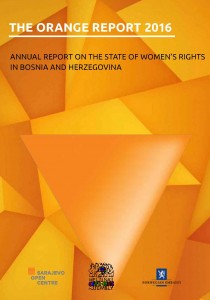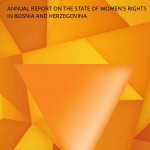 Education – what do the statistics say?
Education – what do the statistics say?
The latest available data on education of women was published by the Agency for Statistics BiH, like in previous years, and it has demonstrated the following: 36,939 students completed their primary education in 2014/2015, 18,246 of who were girls; 43,991 students completed their secondary education in 2014/2015, 21,402 of who were girls. 71,786 girls are attending secondary education in 2014/2015, out of the 143,881 students on the territory of the entire BiH. Therefore it is fair to say that girls and boys participate in primary and secondary education equally.
The situation is somewhat different in higher education. Out of the 96,425 students who entered higher education in 2014/2015, 53,599 were women and 42,826 were men. In 2014, out of the total of 16,351 graduates, 9,740 were women, and in 2014/2015 59% of the graduating class was made up of women. When it comes to postgraduate studies there are more women than men, while there are less women in doctoral degree programs. Out of the 3,364 masters’ students, 2,001 were women, and out of the 301 doctoral students, 116 were women. The data on masters and doctoral students for 2015 is still not available.
Women are also more numerous when it comes to teaching positions. 70.7% teachers in primary schools are women, while that number is 59% for secondary schools.
Gender equality is still not a topic covered in primary and secondary education. Gender equality is not mainstreamed through the education system; stories about men dominate the curricula (men are the authors, historical figures, scientists, etc.) and there has been little effort to eliminate stereotypical portrayals of women and men in public and private life. Out of all the minority communities and women experiencing different facets of discrimination, Roma girls and youth, and boys and girls with disabilities are experiencing the most difficulties. They are almost completely excluded from education.
Participation in the workforce
As in the previous years, data on women’s participation in the workforce is disappointing. The rate of women’s employment in the second quarter of 2015 was merely 41.3%.[i] By comparing the trends in women’s education and employment we can notice that, as in previous years, the rate of women’s employment remains very low. According to the data from the Workforce Survey for 2015,[ii] women make up 49.4% of the active workforce of workers with only primary education, 41.7% of workers with secondary education and only 9.0% of workers with higher education, masters or doctoral degrees, and the numbers are within the same range as in previous years with at most 2% deviations. Although there is a slight downwards trend of women in certain sectors like services and agriculture, the highest number of women still works in the services sector (65.5%) and in a slight increase from last year 17.7% of women are not in agriculture, and 16.8% are. If we look at data from the Cantonal Employment Offices in FBiH more women were seeking employment in December, as compared to January of the same year.[iii]
The position of women in rural areas is still difficult. In 2015 the Government of Republika Srpska implemented the Action Plan for the Improvement of the Position of Women in Rural Areas until 2015. The goals set in the Action Plan were the improvement of the economic status of women in rural areas, improvement in living conditions, access to public services, empowerment of women’s social status and raising awareness of women’s role, significance and contribution to society.[iv] The Government of FBiH had not had special policies aimed at improving the status of women in rural areas, but this question was addressed in the Annual Operative Plan for 2016, which was drafted on the basis of the Gender Action Plan. Employment of women with disabilities remains a significant challenge.
The new Entity Labor Laws
Both Entities passed new Labor Laws in 2015, through emergency parliamentary procedure. Unlike the Labor Law of RS, The Labor Law of FBiH explicitly prohibits discrimination on the basis of, among other things, marital status, family obligations and pregnancy. Overtime work for pregnant women, mothers of children younger than 3 years of age, single parents and adoptive parents of children younger than 6 years of age are prohibited. Although the Labor Law FBiH considers the ban on employment of women in underground workplaces a form of protection, both Laws similarly approach the prohibition of unequal treatment of women and the status of women during pregnancy and birth. The FBiH Law specifies that at the beginning of their employment workers cannot be asked for information irrelevant to their employment, while the RS Law specifies that the employer cannot ask for information on their family/marital status and that they cannot condition the employment on taking a pregnancy test, unless the job itself would present a risk for the mother and the child. Both laws address mobbing. Women are frequently victims of mobbing, but due to fear of losing their job very few cases reach the courts.
Family life and the workforce
When it comes to the rights of new mothers on the territory of FBiH and the differences in maternity allowance based on the canton in which they live and the sector they are employed in, the situation is almost unchanged.
Discrimination of mothers in the private and the public sector is still present because in the private sector the employer is left to cover the difference in pay, while in the public sector this provision is specifically defined in a collective contract and funded from the public budget. Discrimination is based on a) the time when the right to maternity leave can be claimed (from 6 months in Canton Sarajevo and Zapadnohercegovački Canton, to 9 months in Canton 10), b) the amount of the allowance compared to pay (from 50% in Unsko-Sanski Canton and Srednjobosanski Canton; 60% in Sarajevo Canton; 80% in Zeničko-Dobojski and Bosansko-Podrinjski Cantons; 90% Tuzla Canton and 100% in Canton 10). Hercegovačko-Neretvanski Canton makes only a one-off payment of 400 KM to all new mothers.
In the Special Report on the state of the protection of mothers and motherhood in FBiH the Institution of the Ombudsman concluded that the failure of Hercegovačko-Neretvanski Canton to regulate the protection of families with children is a breach of basic rights and that the one-off pay given to new mothers cannot be considered adequate compensation during maternity leave.[v] Eight cantons passed cantonal laws on the Basic of Social Protection, the Protection of Victims of War and the Protection of Families with Children. In September 2015 the Government of Posavski Canton also passed an Order on Maternity Allowance, which the Canton had not been paying until then.
The Labor Law of RS regulates the question of child support by setting up a Public Fund for the Protection of Children RS. The allowance is determined by the average pay the woman had claimed in the 12 months before the start of her maternity leave (Art. 111 and 123). Based on the provisions of the Labor Law RS and the Law on the Protection of Children RS a special fund was established, which recognized employers’ right to funds to be paid as maternity allowance of the net pay to the mother on maternity leave, upon the employer’s written request. In 2014 2651 women and one man claimed this right.[vi]
Although their rights are legally recognized and their pay included in the budget, in new mothers are being denied their rights. In 2015 new mothers started peaceful protests to demand the government end the census on child support so that every child can receive at least 100 KM, take the PDV off the basic baby supplies and make the essential medications for expectant and new mothers free.[vii] A petition asking for the minimum of 100 KM child support was also organized. [viii]
Guidelines for Action
- It is essential to use the Gender Action Plan and the Annual Operative Plans to mainstream gender equality in education (school curricula, teaching plans, textbooks, plans for education and further education of teaching staff);
- It is essential to arrive at a political agreement on legislative regulation of maternity allowance for working mothers and parents (if the father is the one using paternity leave) in the Federation of BiH and to establish a public fund for maternity allowance in order to regulate this right and end discrimination based on the place of employment and habitation;
- Sanction all legal personalities which discriminate against women in employment and in the work environment and ensure proactive work inspections;
- End censorship of child support in RS and secure the basic needs for the child and the mother, including the essential medications.
You can find the Orange Report 2016 – Annual Report on the State of Women’s Rights in BiH following this link.
—
[i] Agency for Work and Employment BiH: Statistički informator. available at: http://www.arz.gov.ba/publikacije/statisticki_informatori/default.aspx?id=2012&langTag=bs-BA
[ii] Agency for Statistics BiH: Anketa o radnoj snazi 2015. available at: http://www.bhas.ba/ankete/LFS_saopcenje-bos.pdf
[iii] Reports of the Cantonal Employment Offices, Available at:
http://www.fzzz.ba/sarajevski-godine/godina-2015-kanton-sarajevo,
http://www.fzzz.ba/tuzlanski-godine/godina-2014-tuzlanski-kanton-2,
http://www.fzzz.ba/unsko-sasnki-godine/godina-2015-unsko-sanski-kanton
[iv] Vlada Republike Srpske. Available at: http://www.vladars.net/sr-SP-Cyrl/Vlada/centri/gendercentarrs/media/vijesti/Pages/Usvojen_Akcioni_plan_za_unapredjenje_polozaja_zena_na_selu_u_RS_do_2015_godine.aspx
[v] Institution of the Human Rights Ombudsman BiH: Special Reports available at: http://www.ombudsmen.gov.ba/documents/obmudsmen_doc2015102111102085bos.pdf
[vi] RS Institute for Statistics, Women and Men in RS, pg. 34. Available at:
http://www2.rzs.rs.ba/static/uploads/bilteni/zene_i_muskarci/Zene_i_muskarci_u_RS_br8.pdf
[vii] Available at: http://www.banjaluka.com/drustvo/2016/01/19/majke-i-trudnice-vratite-nam-dostojanstvo-foto/
[viii] Available at: http://4plus.rs.ba/novisajt/?p=308
 The Orange Report 2016 – Annual Report on the State of Women’s Rights in Bosnia and Herzegovina
The Orange Report 2016 – Annual Report on the State of Women’s Rights in Bosnia and Herzegovina